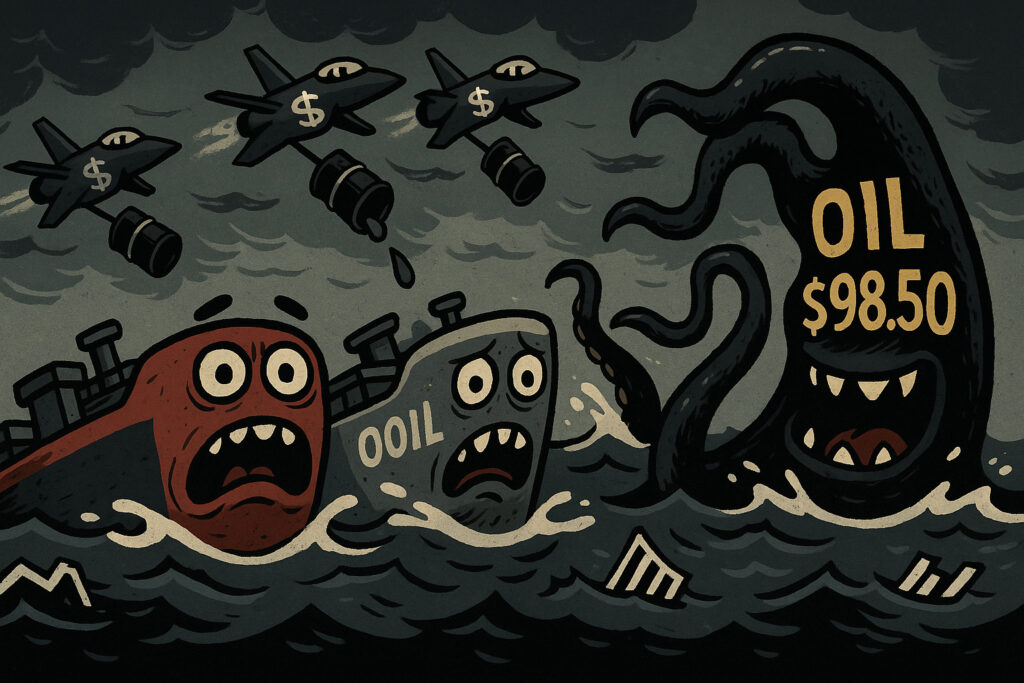On April 16, 2025, financial markets were roiled by escalating geopolitical tensions in the Middle East, specifically a sharp escalation between Iran and Saudi Arabia following a series of military skirmishes along the Strait of Hormuz. These developments had immediate repercussions across global markets: oil prices spiked, equity indices dipped, gold rallied, and volatility surged.
At the time of writing:
- Brent Crude Oil surged to $98.50 per barrel, up 4.8%.
- WTI Crude Oil climbed to $94.30 per barrel, up 5.1%.
- Gold rose to $2,345 per ounce, gaining 1.7%.
- S&P 500 Index declined by 1.2% to 5,020.
- Nasdaq Composite fell by 1.5% to 15,520.
- CBOE Volatility Index (VIX) jumped 18% to 21.5.
- U.S. 10-Year Treasury yield dropped to 4.22%, reflecting a flight to safety.
Main Event: Escalation in the Middle East
Early today, reports confirmed that Iranian naval forces had detained two Saudi oil tankers near the Strait of Hormuz, alleging violations of territorial waters. Saudi Arabia responded with a series of air strikes targeting Iranian Revolutionary Guard bases along the Gulf coast. The U.S. State Department called for “urgent de-escalation,” while NATO ministers convened an emergency session.
The Strait of Hormuz is a critical chokepoint for global oil flows, with approximately 20% of the world’s petroleum passing through it. Any disruption threatens global energy supply chains and has immediate implications for oil prices and broader risk sentiment.
Immediate Market Reactions
Energy Sector
The energy sector reacted first and most dramatically. Brent and WTI crude prices surged nearly 5% in early trading. Energy equities outperformed the broader market:
- ExxonMobil (XOM) rose 2.3% to $123.40.
- Chevron (CVX) climbed 2.1% to $165.75.
- Occidental Petroleum (OXY) gained 3.4% to $71.20.
Oil futures markets are now heavily pricing in an increased risk premium, reflecting fears that a protracted conflict could cut off vital supplies.
Equities
Broader equity markets fell sharply as risk aversion took hold. The S&P 500 and Nasdaq Composite both dropped over 1%. Defense stocks bucked the trend:
- Lockheed Martin (LMT) jumped 4.7% to $489.10.
- Northrop Grumman (NOC) gained 4.5% to $455.00.
Safe Havens
Investors fled to traditional safe havens. Gold prices climbed to fresh highs, while U.S. Treasury yields dropped sharply. The Japanese yen also strengthened:
- USD/JPY fell to 146.70, down from 148.20.
The increased demand for Treasuries pushed bond prices higher, dropping yields as investors sought safety amid growing uncertainty.
Broader Economic Implications
Oil and Inflation
The surge in oil prices reignites inflation concerns just as major central banks were contemplating rate cuts later in 2025. Elevated energy prices could lead to a resurgence in headline inflation, forcing the Federal Reserve and other monetary authorities to adopt a more cautious stance.
Corporate Earnings
Higher input costs could squeeze corporate profit margins, particularly for sectors reliant on energy, such as transportation and manufacturing. Conversely, the energy sector and defense contractors may report upside earnings surprises.
Global Trade
Shipping costs are already on the rise as insurance premiums for Middle East voyages spike. Supply chain disruptions, particularly for energy-intensive industries, could follow if the situation deteriorates further.
Central Banks in Focus
Fed officials have remained publicly silent so far, but futures markets now show a lower probability of rate cuts by September 2025. According to CME FedWatch Tool data:
- The probability of a rate cut by September fell to 48%, down from 62% yesterday.
ECB President Christine Lagarde stated during an IMF panel that “geopolitical instability adds uncertainty to the disinflation path,” hinting that the ECB may also delay easing plans.
Forward-Looking Analysis
Scenarios
- Quick De-escalation: If diplomatic efforts succeed and military tensions ease within days, markets could recover rapidly. Oil prices would likely retreat, and risk assets would bounce back.
- Prolonged Conflict: If clashes escalate into a broader regional conflict, expect sustained oil price increases, a global risk-off environment, higher volatility, and potential recession risks.
Investment Strategies
Given the current landscape, prudent investors are considering:
- Increasing allocations to commodities (particularly oil and gold).
- Rotating into defensive sectors like utilities and consumer staples.
- Adding exposure to defense-related equities.
- Reducing high-beta tech stock exposure.
- Hedging portfolios with volatility instruments (e.g., VIX ETFs).
Conclusion
April 16, 2025, marks a pivotal moment where geopolitical risk surged back into the forefront of investor concerns. With Middle East tensions threatening global energy supplies and market stability, prudent market participants must remain vigilant, flexible, and diversified. Until there is a clear resolution, expect elevated volatility, heightened oil prices, and persistent safe-haven demand.
